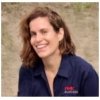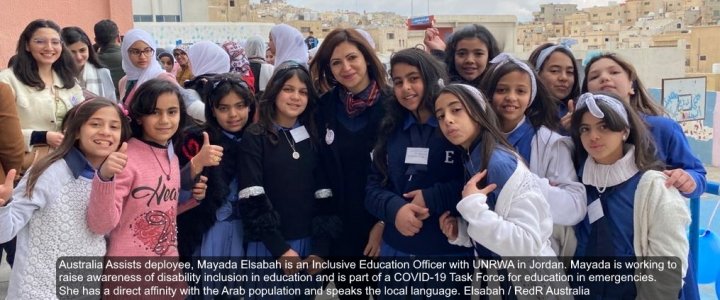As part of our focus area on disability inclusive development, we explore and identify the barriers we face as organisations, that get in the way of progressing our disability-inclusive practices. In a frank and candid interview, RedR Australia’s Kylie Harrington reflects on missteps, learnings, turning points and the power of transforming words into actions.
The best learning moments for organisations can be a result of our mistakes. Can you tell us about any ‘valuable’ mis-steps inpursuing RedR’s commitments to disability inclusion? Was it something like two-steps-forward-one-step-back?
It’s like anything in life in that you make missteps in the attempt to get things right, which for us, in this case is to be much more inclusive. I would say it’s a fairly common experience for many of us to have used language so casually that it’s exclusionary, for example “Can I call you back?” or “I’ll share my screen so you can see…” to colleagues with a lived experience of hearing or vision impairment. You start to understand how language is experienced, and how communication is practiced, differently.
At RedR, the more we’ve moved towards diversifying the partners and people we work with, for example partnering with Organisations of Persons with Disabilities (OPDs) in the Pacific and elsewhere, the more we’ve had these kinds of exchanges. While these examples only relate to the everyday language we use, they can hint at more invisible and systemic barriers. It’s only been in the pursuit of the commitments outlined in our Disability Strategy that we’ve more readily identified what exclusion looks like and all the ways we can do things better. And to be really intentional about how we do that.
In the sector, and definitely in the ACFID Code of Conduct at Commitment 2.4, we talk a lot about the need for analysing the barriers that people with a disability might face, in accessing their right to full and meaningful participation. From an organisational perspective though, what kind of barriers do you think we face, that get in the way of progressing our disability-inclusive practices?
The focus should be on the barriers that people with disabilities continue to face in development and humanitarian contexts, and to really listen to what those varying experiences are and collectively try to address them.
Having said that, we’d be remiss if we didn’t look at ourselves too, to try to identify our own biases and areas of weakness. What I am realising in pursuing our commitments to disability inclusion, as a firm priority for RedR since 2018, is that we can unwittingly create our own barriers. They can be values-based, which are more attitudinal in nature; they can be fear-based, which really is the fear of getting it wrong; or scarcity-based, the idea that we don’t have the resources to do it. I see many organisations, both in Australia and overseas, grapple with some or a mix of all three of these.
On reflection, what was the turning point for your organisation?
The turning point for us was realising that, as a humanitarian training and deploying organisation, we’re in a position to not only educate and upskill ourselves but also our partners and the wider sector. We have the potential to have a multiplying effect.
Several years ago, we initiated a brief review that identified our disability inclusion gaps and opportunities for us to address them. That gave us a starting base, and as a delivery partner for DFAT, there is an expectation that we prioritise people with disabilities in programming, which has prompted us to step up and show leadership in this area.
It has to be organisation-wide. There has to be an intentional and consistent focus, underpinned by clear policies and plans that are ‘alive’ and accountable. RedR’s entire mode of operation is to work in partnership, so we looked for partners with the technical and lived experience that could guide us, and still do. And the conversations within those partnerships aren’t necessarily always comfortable but that’s part of it. Progress has been incremental but consistent. There is much more for all of us to do.
If you had to pick one or two big ticket items that are crucial for organisations to progress their commitment to disability inclusion, what would they be?
I think it’s such a mix of so many things. But I would say it is two-part.
Firstly, it is about getting organisational commitments down ‘on paper’ in the form of a clear, actionable, measurable and time-bound plan – and engage with OPDs from the right cultural contexts to help you. Assign responsibilities to individuals or teams to progress the plan’s commitments and provide support and regular training for them to do that. Monitor what’s working, what’s not working and why. For example, our Disability Action Plan for the Australia Assists program has been instrumental in guiding and accelerating our progress.
Secondly and perhaps on the contrary, getting organisational commitments ‘off paper’ is so important – transforming words into actions that change people’s lives in a tangible way, in our case for people who are working in or are affected by humanitarian disasters. It’s been gratifying for me to see change in practice over time – we have disability inclusion specialists now, for example with OCHA Somalia and WFP in Bangladesh. They obviously play a critical role, but I’ve also seen our technical experts from all kinds of fields take the reins, engaging with people with disabilities in crisis settings to ensure schools, evacuation centres and emergency preparedness plans are appropriate and accessible. They increasingly see it as a responsibility of their role. Sharing those stories helps to normalise the idea that disability inclusion is not optional – it’s a core component of modern humanitarian programming.

Kylie Harrington
Kylie is RedR Australia’s Manager of Strategy and Impact. With a career spanning twelve years working across diverse communities, sectors, donors and agencies, she leads the delivery of evidence-based monitoring, evaluation, accountability and organisational learning. As a RedR Australia Roster Member, Kylie has completed in-situ professional training with UNOCHA, the Norwegian Refugee Council and the International Rescue Committee, among others.









